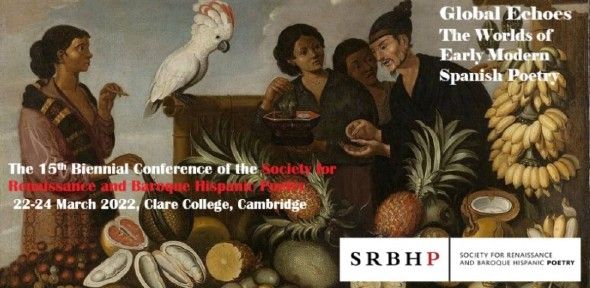
15th Biennial Conference of the Society for Renaissance and Baroque Hispanic Poetry
This event took place in Cambridge from 22-24 March 2022.
The local and international politics of early modern Spain and the Spanish Empire, and its handling of power, capital and knowledge produced a new global world order bringing together four different continents (Europe, Africa, America, and Asia).
The ever-expanding frontiers of the Hispanic monarchy, both near and distant, underscored the complexity of emerging national and imperial subjectivities. This was reflected in the political, racial, religious and linguistic diversity and fragmentation of early modern Hispanic cultures. This conference aims at problematizing general assumptions about the homogeneity of imperial culture in the sixteenth and seventeenth centuries. Regional and political fragmentation sparked conflict in areas such as Portugal and Catalonia, as well as in the New World.
Transatlantic exchanges, warfare and the rise of the slave trade introduced a number of different ethnic groups and religious practices to the peninsula. This generated a richer and more complex social fabric than traditional scholarship has tended to acknowledge. Many of these stimuli and conflicts were voiced through language and the arts, and, in particular, through poetry.
The Global Echoes conference focused on the world dissemination of early modern Spanish poetry, paying attention to Ibero-American transatlantic cultural dialogues, while looking also at transpacific exchanges and beyond, considering the presence of Spanish poetry across the world. This approach also promoted analyses that underscore the linguistic and cultural diversity within and beyond the Iberian peninsula, including the production of texts written in indigenous languages of the Americas (Quechua, Nahuatl, Guarani, etc.), vernacular languages (Catalan, Galician, Portuguese, Italian, etc.) and neo-Latin.
The keynote speakers were Professor Mercedes Blanco (Sorbonne Université) and Professor Roland Greene (Stanford University).
Acknowledgements
The organisers want to thank the Isaac Newton Trust, which has generously contributed to the organization with a Cambridge Humanities Research Grant. We are also grateful for the support offered by the Centre of Latin American Studies.
Downloads
- Abstracts (PDF, 1.46 MB)
- Conference programme (PDF, 1.23 MB)
- Call for the 2nd “SRBHP Founders’ Prize for Best Graduate Student Paper” 2022 (PDF, 120 KB)
- Call for the “SRBHP Host’s Prize for Junior Scholars in Honor of Trevor Dadson” 2022 (PDF, 138 KB)
Contact
Prof Rodrigo Cacho rgc27@cam.ac.uk


